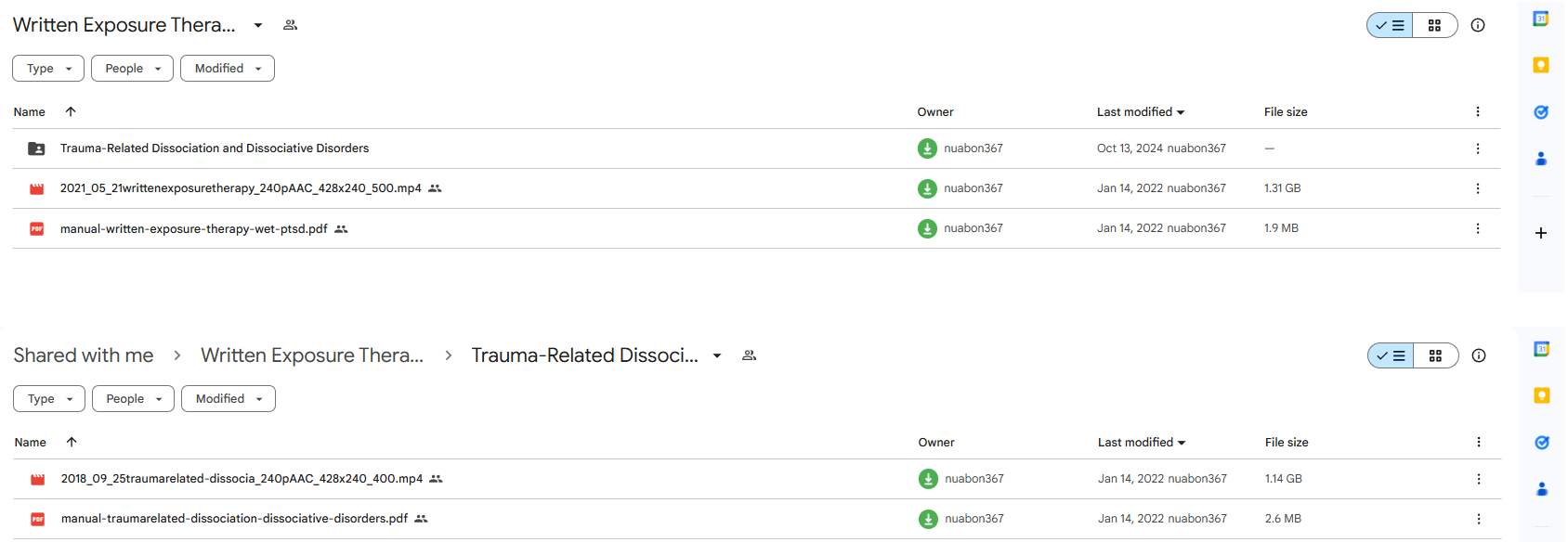*** Proof of Product ***

Exploring the Essential Features of “Written Exposure Therapy for Trauma: Fewer Dropouts and Improved PTSD Treatment Outcomes in 5 Sessions or Less”
Here’s what you’ll learn:
Written Exposure Therapy: Development and Empirical Support
- Necessary and sufficient components for PTSD treatment
- How WET was developed
- Examination of the treatment dose needed for successful PTSD treatment outcome
- Research – efficacy and effectiveness data supporting WET
- Research limitations
- Who are good candidates for WET and who are not
PTSD Assessment
- Review of PTSD diagnostic criteria, including definition of trauma event
- Description of prevalence of PTSD
- Deciding on measures to assess for PTSD
- Monitor symptom severity during course of treatment
The Delivery of WET: Session-by-Session Instructions and Scripts
Session 1
- Psychoeducation
- Treatment rationale
- Instructions on how to conduct the first writing exercise
- Check-in and concluding the session
Session 2-5
- Feedback on previous sessions writings
- Instructions for current session
- Check-in
- Conclusion
- When modifications are needed
The Trauma Narrative: Examples and How to Provide Client Feedback on Narratives
- How to provide feedback when clients do not include emotions in their narrative
- What to do when clients avoid writing about the most distressing part of the event
- How to provide positive and constructive feedback to move the client forward
How to Deliver WET via Telehealth
- The use of videoconferencing
- Getting materials to and from clients when using telehealth
- Solutions to common issues that arise
How to Handle Common Challenges:
Clinical Insights, Tips and Role Play Exercises to Help You Implement WET
- How to manage when clients do not follow writing instructions
- What to do when clients have an increase in PTSD symptoms
- Managing situations in which clients stop writing or refuse to start writing
- Managing comorbid issues, such as substance abuse and suicidal ideation
- Assessing whether additional treatment is needed
Meet Your Experts:
Denise M. Sloan, Ph.D., currently serves as the Associate Director, Behavioral Science Division, National Center for PTSD and a Professor of Psychiatry, Boston University School of Medicine. She is an expert on psychosocial interventions for traumatic stress disorders and has a specific interest in efficient treatment approaches for PTSD. Dr. Sloan conducted a series of studies that lead to the development of Written Exposure Therapy and has conducted multiple large-scale treatment studies examining the effectiveness of this treatment. She has published over 100 scientific articles and has received funding for her work from several organizations, including the Department of Veterans Affairs, National Institute for Mental Health, Department of Defense. Dr. Sloan is Editor of Behavior Therapy, Editor Elect of Journal of Traumatic Stress, and a consulting editor for six scientific journals. Dr. Sloan has over 25 years’ experience treating individuals with PTSD, and she has extensive experience training mental health providers in the delivery of trauma-focused treatments. Dr. Sloan obtained her doctorate in clinical psychology from Case Western Reserve University in 1998.
Brian P. Marx, Ph.D., is Deputy Director, Behavioral Science Division, National Center for PTSD and a Professor of Psychiatry, Boston University School of Medicine. He is an expert in the assessment and treatment of PTSD. With Dr. Denise Sloan, he is the co-developer of Written Exposure Therapy (WET) and has spent the last 20 years conducting a systematic line of research which supports the development and efficacy of this treatment. Dr. Marx has published over 200 scientific articles and has received external funding for his work from numerous organizations including the United States Department of Veterans Affairs, United States Department of Defense, and the Centers for Disease Control and Prevention. Dr. Marx is on the editorial board of several professional journals. He is a previous winner of the Award for Outstanding Contributions to the Science of Trauma Psychology from Division 56 of the American Psychological Association. Dr. Marx obtained his doctorate in clinical psychology from the University of Mississippi.
Please see the full list of alternative group-buy courses available here: https://lunacourse.com/shop/










 Signe Darpinian - Positive Body Image for Teens and Adults: What Clinicians Need to Know
Signe Darpinian - Positive Body Image for Teens and Adults: What Clinicians Need to Know  Ed Ponsi - Forex Trading
Ed Ponsi - Forex Trading  William Barry Inman - Critical Coronavirus Updates for the Healthcare Team: Presented by a CDC/Public Health Epidemiologist
William Barry Inman - Critical Coronavirus Updates for the Healthcare Team: Presented by a CDC/Public Health Epidemiologist  Greg Loehr - Advanced Option Trading With Broken Wing Butterflies
Greg Loehr - Advanced Option Trading With Broken Wing Butterflies  Data Extraction - Chris Mercer
Data Extraction - Chris Mercer  Trade Like Mike - The TLM Playbook 2022
Trade Like Mike - The TLM Playbook 2022  Crypto Dan - The Crypto Investing Blueprint To Financial Freedom By 2025
Crypto Dan - The Crypto Investing Blueprint To Financial Freedom By 2025  George Fontanills & Tom Gentile - Optionetics Wealth Without Worry Course
George Fontanills & Tom Gentile - Optionetics Wealth Without Worry Course  Atlas API Training - API 570 Exam Prep Training Course
Atlas API Training - API 570 Exam Prep Training Course